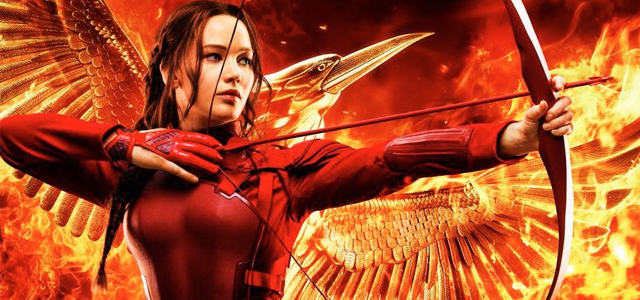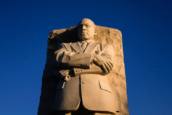
The Hunger Games: Mockingjay Part 2

(M) Starring Jennifer Lawrence, Julianne Moore, Philip Seymour Hoffman, Sam Claflin, Liam Hemsworth, Josh Hutcherson
The Hunger Games first burst onto screens in 2012. It sparked countless commentators to debate the teens-killing-teens story line and endless editorial columns about the value of Young Adult (or YA) fiction and the dystopian future it peddles. A spotlight was placed upon authors such as Suzanne Collins (who wrote The Hunger Games) and how and why their writing was tapping in to a previously maligned genre.
Collins’ books caused the kind of avalanche in book publishing only rivalled by J.K. Rowling’s Harry Potter series. James Dashner’s Scorch Trials were closely followed by Veronica Roth’s Divergent series in 2011. Many of these authors, including Lois Lowry (author of The Giver), had their books banned by schools due to the thematic elements in them that educators thought problematic. And, so, Hollywood sits up and takes notice.
With varying success all of these books have been translated to the screen.
What The Hunger Games did was give audiences a female heroine in the shape of Katniss Everdeen, every bit as good as her male on-screen counterparts. And the Girl on Fire set the box office alight. Here was a young adult fictional character that caused a pop-culture tsunami and legitimised the YA genre in filmmaking. While the storyline wasn’t new -— rural farm girl thrust into public life through a series of life-and-death situations, to emerge as the victor and symbol to unite common people against a corrupt regime — it plugged into a zeitgiest and got people talking.
As the heroine Katniss, the original film rocketed Jennifer Lawrence to being a bona fide star. She moved on to other high-profile films and even garnered an Oscar for Best Supporting Actress in Silver Linings Playbook (also released in 2012). But the same can’t be said of the genre it spawned. Many YA fiction-based adaptations have performed poorly at the box office, although some with the help of loyal fans (The Divergent series) have held onto enough box office takings to keep studios interested in the genre.
Now Showing: The Hunger Games – Mockingjay Part 2 from The Big Picture on Vimeo.
This is the end
Now at film number four in The Hunger Games series, Mockingjay Part 2 literally limps into cinemas (and I say limps, because Katniss has had her fair share of knocks) and it really does feel like it needs to end.
Film criticism aside, it’s no secret that The Hunger Games throws around some very serious moral and ethical questions for its audience to consider. In a book and film marketed to young adults, it presents questions of dispossessed people, government control, war propaganda, news media manipulation, deceit, violence and child killing to consider.
As the story of Katniss and her colleagues draws to its inevitable conclusion, the nation of Panem is on the brink of a full-scale war. Katniss is hungry to confront President Snow (Donald Sutherland) in a final showdown with the man who dictates using fear and televised violence to rule the Capitol.
Initially encouraged to be used as the symbol to unite Panem’s Districts in the war with the Capitol, Katniss decides to team with her closest friends to storm the Capitol. Her plot is against the wishes of President Coin (Julianne Moore) who, instead, would like to use “The Mockingjay” to further her career.
Katniss goes off on a mission with the unit including Gale (Liam Hemsworth), Finnick (Sam Claflin), Peeta (Josh Hutcherson), camera-toting Cressida (Natalie Dormer) and squad leader Boggs (Mahershala Ali). They risk their lives to liberate the citizens of Panem, through an assassination attempt on Snow who has become increasingly obsessed with destroying Katniss.
This franchise belongs to Jennifer Lawrence. There is no doubt about that, and Lawrence is ably supported in this final instalment by an excellent cast — even though they barely have anything to do. This is a shame because more character development could have helped both Mockingjay Part One and Two feel less drawn out.
Special mention must go to Donald Sutherland’s President Snow. His amused disdain about Katniss has made him a worthy, if emotionally wrought opponent over the course of the four films. Many other regular actors, such as Woody Harrelson (Haymitch) and Elizabeth Banks (Effie Trinket) had their time to shine in other instalments. To a large degree, this final film focuses on the teetering allegiance’s of Coin (Moore), Katniss and the Rebel uprising. Josh Hutcherson and Liam Hemsworth have little to do and are mostly sidelined to make way for Lawrence’s final showdown.
The lack of Phillip Seymour Hoffman’s Plutarch Heavensbee — right hand man to Moore’s Coin — is felt in this instalment also. Hoffman had only completed a handful of scenes for Part Two before his untimely death. The impact of one key monologue is lessened due to Hoffman’s absence. His character should have delivered this speech but, instead, it is merely read as a letter to Katniss.
Focus is lacking
These films for better or worse – like the books – have been told from Katniss’ perspective. In film form, this has enabled directors to gloss over some of the more gory details of the books (which means the movies only get an ‘M’ rating, rather than the highly restrictive MA15+).
Anyone who has read the final book will know it spares no expense in going into great detail, particularly with the traps set in the lead up to the Capitol takeover.
In some of the more emotional scenes in Mockingjay — Part Two, Katniss’ perspective is less successful when the camera lingers on an expression or reaction at the expense of logic or, even, impact. A major plot point during the climax seems watered down because of focus upon Katniss’ point of view. We are left to rely on her emotion to feel the impact of this scene.
This first-person perspective worked very well in the first and second films where Katniss was forced to fight. But during the final two claustrophobic films, it has felt strangely limiting. Also, less focus upon Katniss during the final films could have added more weight to the larger scale issues at play all around her. Mockingjay is very much about war propaganda and how news media will editorialise what we view. But that’s not brought into focus by the films.
Three large scale action sequences give punctuation to perfunctory scenes of dialogue which barely move the story along at some points. This makes you wish for some action — any action — to propel the story forward to its conclusion. At two hours and fifteen minutes, Mockingjay — Part Two feels about half an hour too long. Oh, and it also suffers from an overlong ending (as if it has two or three separate endings). Although this final Hunger Games movie follows the book scene for scene, it could have wrapped the story up WITHOUT the audience wishing it would just finish already. “It gets a little tedious after all these years,” admits Katniss as she reflects on how she lived her life and fulfilled her obligations. The movie series itself has that very sense of overstaying its welcome.
Still, the filmmakers are giving fans every beat of the last critical points from the book. And despite Mockingjay — Part Two not being a terrific movie, it’s no secret that The Hunger Games throws around some very serious moral and ethical questions for its audience to consider. In a book and film marketed to young adults, it stirs up deeper consideration of issues to do with dispossessed people, government control, war propaganda, news-media manipulation, deceit, violence and child killing.
For the most part, Katniss takes a very pragmatic approach to her situation. She knows she must survive to return to her sister and family, whom she loves and protects. She is unwilling to lay down her own life because she has things worth living for. Her empathy and ethics will not allow her to become the ruthless killer that the Capitol requires for its own subjugation and entertainment. All these sorts of ethical and moral questions are raised by this series of books and films.
We have embraced the story of Katniss Everdeen and the society of Panem, so the conversation does remain about the “Girl on Fire”: If you were put in the same position as Katniss, what would you do?
What the Bible says about the themes in the film
Is violence ever justified? (Isaiah 60:18, Matthew 5:38-39, Proverbs 3:31)
What is the nature of sacrifice? (Romans 5: 8, John 15: 12-14, John 3: 16)
How can we know we are working for the greater good? (Romans 8; 28, 1 Corinthians 12:7, Ephesians 4:29)
Adrian Drayton is the Editor of Insights




























































